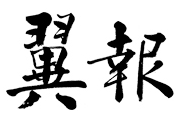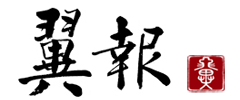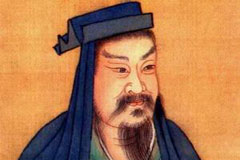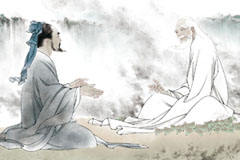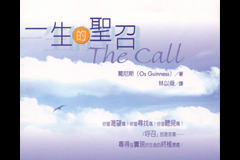拿破崙頌
秤量漢尼拔〔的骨灰〕:你發現最偉大領袖有多少磅?
--朱諾維爾,諷刺詩X
尼普司[西羅馬]皇帝的品德和軍事天才,受高度讚揚,元老院,意大利人,和高盧人,都認為他了不起;那些私人受過他好處的人,更以預言的語氣談到他的復位是人民的幸福...他為了多活幾年,可恥的退位,成為在皇帝和難民之間的邊際人物,直到—
--吉朋,羅馬帝國衰亡史
I

拿破崙 Napoleon Bonaparte
定局了—昨日還稱帝稱王!
率兵將與諸王爭雄逞強—
現在你成為無名之物:
那麼低鄙—卻仍然健旺!
豈是那千個寶座的人
把敵他的屍骨散在我們的地上,
他能夠存活着那樣?
他曾被誤稱為清晨之星,
沒有人或魔鬼墜落得如此深長。
II
謬妄的人!為何鞭笞同類
他們曾卑躬屈膝?
注視自己的光耀使你盲目,
你教導別人能認識。
有權威無可質疑—拯救的能力—
給崇拜你的那些人
墳墓是你唯一的恩賜;
在他們滅亡前人怎得知
野心連卑微都不及!
III
多謝那功課—那將教導
後面的戰士們
比高深的哲學更好,
從前的教訓徒勞。
那要印進人的頭腦
破碎不能再完整,
他們被引領崇拜的
偶像會揮舞戰刀,
前胸是銅的,有泥土的雙腳。
IV
那凱旋,和那虛榮,
那奮戰的狂喜—
勝利的聲音震地,
成為你的生命氣息;
刀劍,權杖,和支配
順從似是人受造的目的,
因此聲譽充斥—
全都消逝!—幽暗的靈!那將是
你瘋狂的記憶!
V
使人荒涼的成為荒涼!
勝利者被打倒!
裁決別人命運者
自己向人求告!
是否還有帝國的指望
使你能平靜面對這樣的風暴?
或是孤獨的懼怕死亡來到?
死為王子—或活為奴隸—
你的選擇是最不光榮的自保!
VI
古時有人劈開橡樹,
作夢也想不到它復合;
被樹榦夾住難以掙脫—
何其孤單—四顧只自己一個?
你,以你的威嚴和能力,
也建立同樣的工作,
不幸的命運臨到:
成為林中豺狼的獵物;
你將要椎心悔恨難過!
VII
那羅馬人,當他的內心激忿
曾經使血濺羅馬,
丟下短劍—敢於離開,
以殘暴的英偉,退隱回家—
他不畏極大的譏諷
那些人服在他那樣的重軛下,
留給他如何的咒罵!
他唯一的榮耀完全在於
自制放下權威的一剎那。
VIII
那西班牙人,當支配慾
失去使人興奮的魅力,
丟棄冠冕換取玫瑰經,
從帝國改為修道的靜室,
嚴謹的數着他的念珠,
精密的辯證信條析理,
他的晚年安然度過:
沒有誰比他更經歷過
獨裁的寶座,或虔信者的廟祠。
IX
可是你—吝惜的手
曾掌握過雷電—
遲延太久不肯放下政權
你軟弱的依戀;
你所有的邪惡的靈,
足夠使你的心悲慘
願見你自己鬆弦;
思想神美好的世界
腳凳竟有這樣的卑賤;
X
大地曾為他血流,
他因此得以免於流血!
君王們俯伏肢體顫抖
感謝他賞賜寶座!
美好的自由!我們珍視寶愛,
是最強大的仇敵叫你懼怯
以最謙卑的形像裝作。
噢!暴君不再有餘地
留下更動人的名字給人類述說!
XI
你的惡行留下血漬斑斑,
所有的紀錄不至徒然—
你的勝利不再述說你的名聲,
或是加深每一污染:
如果你如榮譽死亡,
這世界會再度蒙羞,
可能有些箇拿破崙新興—
但誰要像太陽一樣高升,
在如此無星的夜空?
XII
被稱在天平裏,英雄灰塵
與低賤的泥土並無分別;
會死的人啊!你的衡量
對一切人都公平無邪:
不過我想活着的偉人
會發動更高的火花
使人目眩或竟幻滅:
不能有蔑視而因此歡笑
那些地面上的征服者。
XIII
她,仍然是你的皇后,
驕傲的奧地利之花可哀可憐;
她胸懷怎忍受那考驗的時刻?
她仍然緊貼在你的身邊?
她豈也要屈從,也要分擔
長久失望,你的悔改太晚,
你失去寶座的殺人犯?
若她依然愛你,保守那珍寶,—
那值得你消失的皇冠!
XIV
趕快去你陰沉的海島,
注視那海水悠悠;
大自然會向你微笑—
從來不曾被你羈留!
或用你全然空閒的手
逍遙的讓沙粒微流
現在這大地也自由!
如今那哥林多的教師
把他的醜名轉到你的眉頭。
XV
你帖木兒!在他俘虜的籠裏
你可有甚麼心思,
在籌畫着你監禁的忿激?
只一個—“這世界原是我的!”
除非,像巴比倫王,
所有理性和權杖一併消逝,
生命將不再受禁制
遂心所欲那麼寬廣無際—
長久順從—何等微小的價值!
XVI
或像天上盜火的賊,
那震驚你可承受得起?
你可與他同擔永不得赦免,
他的巨石和他的鷹鷙!
受神預定的懲罰—被人咒詛,
那最後的行動,雖不是你最壞的,
卻是魔鬼最大的譏刺;
他墮落卻得把自尊保持,
如果是必死的人,也該傲然崩逝!
XVII
曾有那一天—曾有那一時,
大地屬於高盧—高盧屬你—
當時那無限的權力
若及早退位放棄
那行動是更清高的榮譽
勝於留戀在瑪崙郭的偉績
使你如光輝的落日,
在漫長的蒼茫暮色裏
雖然有些浮雲飄過的罪跡。
XVIII
可是你命定必作王
穿着那紫色的外套,
任那愚昧的長袍
絞扭着記憶從你的胸抱。
哪裏是你褪色的服裝?哪裏是
你喜歡配戴的虛華珍寶
那星,那繩,那冠上的羽毛?
帝國虛榮剛愎的孩子!說,
你所有的玩具可都被奪掉?
XIX
疲勞的眼將在哪裏停息
當巡視着英雄群;
哪裏沒有罪咎的光榮,
也沒有污跡可尋?
是的—一位—最先的—最後的—最好的—
西方的辛森那徒,
只羨妒不敢恨他,
名垂宇宙的華盛頓,
使丈夫赧顏的唯此一人!
註:
拿破崙(Napoleon Buonaparte, 1769-1821),生於科西嘉(Corsica),由軍曹洊升將軍(1793),稱霸法國,而雄踞歐洲。1804年稱帝。1912年,征俄失敗。1814年,戰敗後退守巴黎。四月六日,Fontainebleau和約退位,被放逐至厄爾巴(Elba)島。1815年,逃返巴黎,復位百日,重建軍爭雄;六月十八日,遭聯軍擊敗於滑鐵盧(Waterloo),再度退位,被放逐聖海倫娜島(St. Helena),由英國管制。1821年三月五日崩逝。
詩人拜倫(Lord George Gordon Byron, 1788-1824)為英國浪漫詩人中最著名者,像當時許多人一樣,對拿破崙有既崇拜又恨的複雜感情;比之對華盛頓,則只有羨慕而無恨意(見XIX)。
I 定局了:指和約簽訂,拿破崙退位。此詩作於1814年四月十日,隱名發表於四月十六日。
VI 橡樹:據傳,希臘運動家彌婁(Milo, c. 6th cen. BC)企圖用手分開劈裂的橡樹,不意楔子墜落,樹榦復合,夾住了他的手臂,無法掙脫,為林中的群狼所噬。
VII 那羅馬人:索拉(Felix Lucius Cornelius Sulla, c. 138-78 BC)羅馬名將,政治家獨裁者。
VIII 那西班牙人:神聖羅馬帝國皇帝查理五世(Charles V, 1500-1558),退位隱於修院。
XIII 皇后:拿破崙的第二妻子瑪莉(Marie Louise, 1791-1847),於拿破崙退位後,挈其子至維也納。
XIV 海島:拿破崙被放逐的厄爾巴島。
哥林多的教師:迪昂逸修(Dionysius the Younger, c. 397-343 BC)西里求斯和西西里的統治者,曾兩被放逐;公元前343年,退到哥林多,設學授徒。
XV 帖木兒:帖木兒(Timur,譯名Tamerlane,或Taimur, 1336-1405)率蒙古軍西征,於1402年征服鄂圖曼(Ottoman),擒其蘇丹巴哈則(Bajazet I,c.1347-1403)囚於木籠中。曾征服歐洲及於地中海,歐人畏懼,稱為“天之刑鞭”。拿破崙曾被視為歐洲的帖木兒,今竟然被囚。
巴比倫:指巴比倫王尼布甲尼撒(但四:28-37)因狂傲而一度精神失常。
XVI 天上盜火賊:希臘神話,普羅米修斯(Prometheus),因從天上盜火給人間,被宙斯(Zeus)處罰,綁在高加索山的石上,巨鷹每天來啄食他的肉。
XVII 高盧(Gaul):歐洲西部古國,包括法國,比利時,荷蘭,德國,意大利北部,及瑞士。亦用指法國。
瑪崙郭(Marengo):1800年六月,拿破崙大敗奧地利軍於此。
XIX 辛森那徒(Lucius Quinctius Cincinnatus, c.519-439 BC):羅馬將領及政治家,有品德,躬耕於小農莊,簡樸,英明,善戰,而堅主共和。
Ode to Napoleon Buonaparte
“Expende Annibalem:—quot libras in duce summo Invenies?”—
Juvenal, Sat. X
“The Emperor Nepos was acknowledged by the Senate, by the Italians, and by the Provincials of Gaul; his moral virtues, and military talents, were loudly celebrated; and those who derived any private benefit from his government announced in prophetic strains the restoration of public felicity... By the shameful abdication, he protracted his life a few years, in a very ambiguous state, between an Emperor and an Exile, till—”
Gibbon's Decline and Fall
I
'Tis done— but yesterday a King!
And armed with Kings to strive—
And now thou art a nameless thing:
So abject—yet alive!
Is this the man of thousand thrones
Who strewed our earth with hostile bones,
And can he thus survive?
Since he, miscalled the Morning Star,
Nor man nor fiend hath fallen so far.
II
Ill-minded man! why scourge thy kind
Who bowed so low the knee?
By gazing on thyself grown blind,
Thou taught’st the rest to see.
With might unquestioned,— power to save,—
Thine only gift hath been the grave
To those that worshipped thee;
Nor till thy fall could mortals guess
Ambition’s less than littleness!
III
Thanks for that lesson— it will teach
To after-warriors more
Than high Philosophy can preach,
And vainly preached before.
That spell upon the minds of men
Breaks never to unite again,
That led them to adore
Those Pagod things of sabre-sway,
With fronts of brass, and feet of clay.
IV
The triumph, and the vanity,
The rapture of the strife—
The earthquake-voice of Victory,
To thee the breath of life;
The sword, the sceptre, and that sway
Which man seemed made but to obey,
Wherewith renown was rife—
All quelled!— Dark Spirit! what must be
The madness of thy memory!
V
The Desolator desolate!
The Victor overthrown!
The Arbiter of others’ fate
A Suppliant for his own!
Is it some yet imperial hope
That with such change can calmly cope?
Or dread of death alone?
To die a Prince—or live a slave—
Thy choice is most ignobly brave!
VI
He who are old would rend the oak,
Dreamed not of rebound;
Chained by the trunk he vainly broke—
Alone—how looked he round?
Thou, in the sternness of thy strength,
An equal deed hast done at length,
And darker fate hast found:
He fell, the forest prowler’s prey;
But thou must eat thy heart away!
VII
The Roman, when his burning heart
Was slaked with blood of Rome,
Threw down the dagger—dared depart,
In savage grandeur, home.—
He dared depart in utter scorn
Of men that such a yoke had borne,
Yet left him such a doom!
His only glory was that hour
Of self-upheld abandoned power.
VIII
The Spaniard, when the lust of sway
Has lost its quickening spell,
Cast crowns for rosaries away,
An empire for a cell,
A strict accountant of his beard,
A subtle disputant on creeds,
His dotage trifled well:
Yet better had he neither known
A bigot’s shrine, nor despot’s throne.
IX
But thou— from thy reluctant hand
The thunderbolt is wrung—
Too late thou leav’st the high command
To which thy weakness clung;
All Evil Spirit as thou art,
It is enough to grieve the heart
To see thine own unstrung;
To think that God’s fair world hath been
The footstool of a thing so mean;
X
And Earth hath spilt her blood for him,
Who thus can hoard his own!
And Monarchs bowed the trembling limb,
And thanked him for a throne!
Fair Freedom! we may hold thee dear,
When thus thy mightiest foes their fear
In humblest guise have shown.
Oh! ne’er may tyrant leave behind
A brighter name to lure mankind!
XI
Thine evil deeds are writ in gore,
Nor written thus in vain—
Thy triumphs tell of fame no more,
Or deepen every stain:
If thou hadst died as Honour dies,
Some new Napoleon might rise,
To shame the world again—
But who would soar the solar height,
To set in such a starless night?
XII
Weigh’d in the balance, hero dust
Is vile as vulgar clay;
Thy scales, Mortality! are just
To all that pass away:
But yet methought the living great
Some higher sparks should animate
To dazzle and dismay:
Nor deem’d Contempt could thus make mirth
Of these, the Conquerors of the earth.
XIII
And she, proud Austria’s mournful flower,
Thy still imperial bride;
How bears her breast the torturing hour?
Still clings she to thy side?
Must she too bend, must she too share
Thy late repentance, long despair,
Thou throneless Homicide?
If still she loves thee, hoard that gem,—
’Tis worth thy vanished diadem!
XIV
Then haste thee to thy sullen Isle,
And gaze upon the sea;
That element may meet thy smile—
It ne’er was ruled by thee!
Or trace with thine all idle hand
In loitering mood upon the sand
That Earth is now as free!
That Corinth’s pedagogue hath now
Transferred his by-word to thy brow.
XV
Thou Timour! in his captive’s cage
What thought will there be thine,
While brooding in thy prisoned rage?
But one—“The world was mine!”
Unless, like he of Babylon,
All sense with thy sceptre gone,
Life will not long confine
That spirit poured so widely forth—
So long obeyed—so little worth!
XVI
Or, like the thief of fire from heaven,
Wilt thou withstand the shock?
And share with him, the unforgiven,
His vulture and his rock!
Foredoomed by God—by man accurst,
And that last act, though not thy worst,
The very Fiend’s arch mock;
He in his fall preserved his pride,
And, if a mortal, had as proudly died!
XVII
There was a day—there was an hour,
While earth was Gaul’s—Gaul thine—
When that immeasurable power
Unsated to resign
Had been an act of purer fame
Than gathers round Marengo’s name
And gilded thy decline,
Through the long twilight of all time,
Despite some passing clouds of crime.
XVIII
But thou forsooth must be a King
And don the purple vest,
As that foolish robe could wring
Remembrance from thy breast.
Where is that faded garment? where
The gewgaws thou wert fond to wear,
The star, the string, the crest?
Vain froward child of Empire! say,
Are all thy playthings snatched away?
XIX
Where may the wearied eye repose
When gazing on the Great;
Where neither guilty glory glows,
Nor despicable state?
Yes—One—the first—the last—the best—
The Cincinnatus of the West,
Whom Envy dared not hate,
Bequeathed the name of Washington,
To make man blush there was but one!![]()
1814

Lord George Gordon Byron
(1785-1824)
